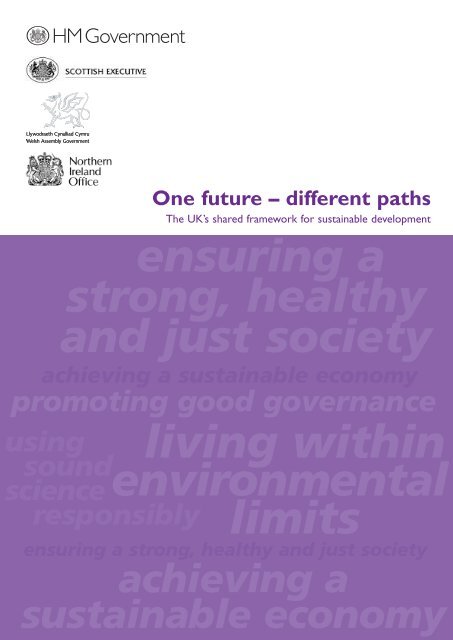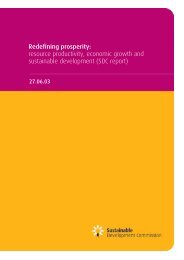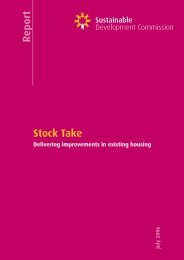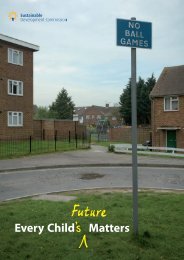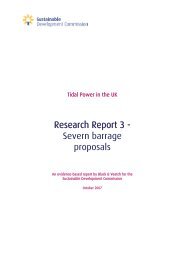One future â different paths - Sustainable Development Commission
One future â different paths - Sustainable Development Commission
One future â different paths - Sustainable Development Commission
Create successful ePaper yourself
Turn your PDF publications into a flip-book with our unique Google optimized e-Paper software.
<strong>One</strong> <strong>future</strong> – <strong>different</strong> <strong>paths</strong><br />
The UK’s shared framework for sustainable development<br />
ensuring a<br />
strong, healthy<br />
and just society<br />
achieving a sustainable economy<br />
promoting good governance<br />
using<br />
sound<br />
science<br />
responsibly<br />
living within<br />
environmental<br />
limits<br />
ensuring a strong, healthy and just society<br />
achieving a<br />
sustainable economy
Department for Environment,Food and Rural Affairs<br />
Nobel House<br />
17 Smith Square<br />
London SW1P 3JR<br />
Telephone 020 7238 6000<br />
Website:www.defra.gov.uk<br />
© Crown copyright 2005<br />
Copyright in the typographical arrangement and design rests with the Crown.<br />
This publication (excluding the logo) may be reproduced free of charge in any format or medium provided that it is<br />
reproduced accurately and not used in a misleading context.The material must be acknowledged as Crown<br />
copyright with the title and source of the publication specified.<br />
Further copies of this publication are available from:<br />
Defra Publications<br />
Admail 6000<br />
London<br />
SW1A 2XX<br />
Tel:08459 556000<br />
This document is also available on the Defra website.<br />
Published by the Department for Environment,Food and Rural Affairs.Printed in the UK,March 2005,on material<br />
containing 80% post-consumer waste and 20% Elemental Chlorine Free pulp.<br />
Product code PB10591
STRATEGY FRAMEWORK<br />
1<br />
<strong>One</strong> <strong>future</strong> – <strong>different</strong> <strong>paths</strong><br />
The UK’s shared framework for sustainable development<br />
“The past 20 years have seen a growing realisation that there are models of development which<br />
are simply unsustainable.We live in a world coping with the consequences of climate change and<br />
many resources strained by patterns of production and consumption.This joint framework<br />
represents a decisive move toward more sustainable development – a move we are making not<br />
merely because it is the right thing to do,but because it is in our own long-term interests.<br />
<strong>Sustainable</strong> development,across the UK,is not an option.It is a necessity.”<br />
The Rt Hon Tony Blair MP,Prime Minister<br />
“We did not care enough in the past about our environment and our planet’s scarce resources.<br />
Now we have to tackle the problems we have inherited,and learn to stop causing new ones.This is<br />
not just about the environment:it is about people and quality of life.This is why in Scotland we are<br />
committed to environmental justice for those who suffer most from poor environments.The<br />
challenge is to make economic growth sustainable. We can and must break the link with<br />
environmental damage.Being more efficient with our resources will make our businesses more<br />
competitive and our economy more productive.Government must lead but all of us must act now.<br />
We must all be prepared to change the way we lead our lives and leave a better legacy for those<br />
who come after us.”<br />
The Rt Hon Jack McConnell MSP,the First Minister,Scottish Executive<br />
“Wales knows all about the human and environmental consequences of unsustainable models of<br />
development.For a generation or more,we’ve been dealing with that legacy within Wales,while at<br />
the same time as reinventing our economy. That process continues. We need to ensure better<br />
life-chances for all our people,and we have a practical interest in reducing the demands our way of<br />
life places on the planet.Living better but with less impact on the environment of our planet will<br />
mean making some hard choices that will call for real powers of political persuasion that will test<br />
our leadership to the full.For our children and their children’s sake we cannot afford to fail that test.”<br />
The Rt Hon Rhodri Morgan AM,the First Minister,Welsh Assembly<br />
Government
2<br />
ONE FUTURE – DIFFERENT PATHS<br />
“We recognise the significance of the sustainability issues created as a result of our current<br />
lifestyles and appreciate that it will require action by all of us to ensure that the resources we<br />
produce and consume and the manner in which we live reflect the principles of sustainable<br />
development.The framework provides an opportunity for leadership and co-operation across<br />
government with a focus for action on priority areas.In supporting this approach and in progressing<br />
a sustainable development strategy for Northern Ireland we will work closely with communities,the<br />
business sector and environmental groups to negate adverse impacts,encourage innovation and<br />
grasp the opportunities that can effect real change and safeguard the <strong>future</strong>.”<br />
The Rt Hon Paul Murphy MP,Secretary of State for Northern Ireland<br />
We commit our Governments to the purpose and principles set out here,agree to support each<br />
other in delivering sustainable development in the UK,and to be held accountable for that delivery.
STRATEGY FRAMEWORK 3<br />
1. Strategic framework<br />
In 1999,the UK devolved many powers to new democratic bodies in Scotland,Wales and<br />
Northern Ireland.Since then,as new bodies we have been creating our own solutions to<br />
the shared challenge of sustainable development. As <strong>different</strong> parts of the UK, our ability to<br />
set our own priorities and find our own answers is an important part of achieving sustainability.<br />
The model for the UK’s strategic approach to sustainable development reflects this new<br />
structure of decision-making.Instead of one strategy document,we will each have our own.<br />
But there are still common challenges and goals.This framework document sets out what<br />
those are,and is an affirmation that,although we have devolved government, we will work<br />
to common goals without compromising the strengths which our diversity of approach<br />
offers.The framework demonstrates our commitment to work together – wherever we<br />
live in the UK – to meet our shared goals.<br />
In the consultation on the new UK <strong>Sustainable</strong> <strong>Development</strong> Strategy,we therefore<br />
committed ourselves to produce a UK strategic framework for sustainable development to<br />
2020, agreed by the UK Government and the administrations in Scotland, Wales and<br />
Northern Ireland,to provide a consistent approach and focus across the UK.<br />
This framework,launched in conjunction with the UK Government Strategy,comprises:<br />
• a shared understanding of sustainable development;<br />
• a common purpose outlining what we are trying to achieve and the guiding principles<br />
we all need to follow to achieve it;<br />
• our sustainable development priorities for UK action,at home and internationally;and<br />
• indicators to monitor the key issues on a UK basis.<br />
Delivering the Framework<br />
The strategic framework will be supported by separate strategies for each administration.<br />
These will build on existing work and translate this framework’s aims into action,based on<br />
our <strong>different</strong> responsibilities,needs and views.These strategies will include further<br />
priorities,and be supported by additional measures and indicators.
4<br />
A SHARED ENDEAVOUR<br />
Section 2. A Shared 1 Endeavour<br />
Aims,objectives and key achievements<br />
In Scotland,the Scottish Executive’s commitment to<br />
sustainable development was reaffirmed in A<br />
Partnership for a Better Scotland in May 2003.This sets<br />
the goal of a Scotland that delivers sustainable development;that puts environmental<br />
concerns at the heart of public policy and secures environmental justice for all of Scotland’s<br />
communities.<strong>Sustainable</strong> development has been a cross cutting theme of the last two<br />
Scottish spending reviews.Our vision,priorities and indicators for sustainable development<br />
were set out in Meeting the Needs… Priorities, Actions and Target for <strong>Sustainable</strong> <strong>Development</strong><br />
in Scotland in April 2002,since when progress reports have been published annually.We will<br />
develop a Scottish sustainable development strategy working closely with key stakeholders<br />
in Scotland during 2005.<br />
In Wales,the National Assembly has a legal duty to develop a<br />
Scheme setting out how we will promote sustainable development in<br />
exercising all our functions.Our first Scheme,Learning to live<br />
<strong>different</strong>ly,was launched in November 2000.It committed us to take<br />
account of sustainable development in all our decision-making and to<br />
work in partnership with others to promote it.After the Assembly<br />
election in May 2003,the effectiveness of the first Scheme was independently reviewed.<br />
Flowing from that review,sustainable development was built into the Welsh Assembly<br />
Government’s new strategic agenda Wales: A Better Country and in March 2004,we,the<br />
Assembly,adopted a revised Scheme Starting to live <strong>different</strong>ly aimed at creating a sustainable<br />
Wales.Our programme for putting the new Scheme into effect is set out in our <strong>Sustainable</strong><br />
<strong>Development</strong> Action Plan published in October 2004.<strong>Sustainable</strong> development is built into<br />
the testing of policies,the operational planning process,and reviews of expenditure.We<br />
publish progress reports annually.
STRATEGY FRAMEWORK 5<br />
In Northern Ireland,the Northern Ireland Executive (in its<br />
Programme for Government 2002-2005),explicitly placed<br />
sustainable development at the heart of our work programme.<br />
This commitment continues to underpin the development and<br />
delivery of public sector policies and services whilst work on a sustainable development<br />
strategy is being progressed. When completed,our Northern Ireland <strong>Sustainable</strong><br />
<strong>Development</strong> Strategy will set out a long-term vision of sustainable development,together<br />
with a series of high-level objectives.The strategy will be underpinned by an Implementation<br />
Plan which will set out the detailed actions to be undertaken to deliver both the high level<br />
objectives and a series of lower level objectives and targets based on the <strong>different</strong><br />
responsibilities,needs and views within Northern Ireland. We are aiming to launch our<br />
own sustainable development strategy and supporting indicator set in 2005.<br />
The UK Government is launching its new<br />
strategy for sustainable development,<br />
Securing the <strong>future</strong>,in conjunction with this Framework.It takes account of developments<br />
since 1999,both domestically and internationally:the changed structure of government in<br />
the UK with devolution to Scotland,Wales and Northern Ireland;greater emphasis on<br />
delivery at regional level and the new relationship between government and local<br />
authorities.It takes account of new policies since 1999,and it highlights the renewed<br />
international push for sustainable development from the World Summit on <strong>Sustainable</strong><br />
<strong>Development</strong> in Johannesburg in 2002.The lead Department,Defra,chairs a Programme<br />
Board to oversee delivery of the Strategy,but all UK Departments share responsibility for<br />
making sustainable development a reality.
6<br />
A COMMON PURPOSE<br />
Section 3. A Common 1 Purpose<br />
Aims,objectives and key achievements<br />
To set the United Kingdom on a more sustainable track,we must know what we are aiming<br />
for. The 1999 strategy set out clearly that sustainable development means “a better quality<br />
of life for everyone,now and for generations to come”,and used the widely used<br />
international definition “development which meets the needs of the present without<br />
compromising the ability of <strong>future</strong> generations to meet their own needs.” 1<br />
The four aims developed for the 1999 strategy were:<br />
• social progress which recognises the needs of everyone;<br />
• effective protection of the environment;<br />
• prudent use of natural resources;and<br />
• maintenance of high and stable levels of economic growth and employment.<br />
These aims effectively captured the simple idea at the heart of sustainable development.<br />
However,although the 1999 strategy stressed that these objectives had to be pursued at<br />
the same time,in practice,<strong>different</strong> agencies focused on those one or two most relevant to<br />
them.So a new purpose is needed to show how government will integrate these aims and<br />
evolve sustainable development policy – to develop the earlier strategy,not depart from it.<br />
It needs to paint a picture of what things should look like if we achieve sustainable<br />
development,while maintaining continuity with the aims of the 1999 strategy.<br />
The following ‘purpose’,which has been agreed by the UK Government and the Devolved<br />
Administrations,has now been adopted as the new framework goal for sustainable<br />
development:<br />
1 From Our Common Future (The Brundtland Report) – Report of the 1987 World <strong>Commission</strong> on Environment<br />
and <strong>Development</strong>.Oxford University Press 1987.
STRATEGY FRAMEWORK 7<br />
The New Framework Goal for <strong>Sustainable</strong> <strong>Development</strong><br />
The goal of sustainable development is to enable all people throughout the world to<br />
satisfy their basic needs and enjoy a better quality of life without compromising the<br />
quality of life of <strong>future</strong> generations.<br />
For the UK Government and the Devolved Administrations,that goal will be pursued<br />
in an integrated way through a sustainable,innovative and productive economy that<br />
delivers high levels of employment,and a just society that promotes social inclusion,<br />
sustainable communities and personal well-being.This will be done in ways that protect<br />
and enhance the physical and natural environment,and use resources and energy as<br />
efficiently as possible.<br />
Government must promote a clear understanding of,and commitment to,sustainable<br />
development so that all people can contribute to the overall goal through their<br />
individual decisions.<br />
Similar objectives will inform all our international endeavours,with the UK actively<br />
promoting multilateral and sustainable solutions to today’s most pressing<br />
environmental,economic and social problems.There is a clear obligation on more<br />
prosperous nations both to put their own house in order and to support other<br />
countries in the transition towards a more equitable and sustainable world.
8<br />
GUIDING PRINCIPLES<br />
4. Guiding Principles<br />
As the UK Government,Scottish Executive,Welsh Assembly Government and the<br />
Northern Ireland Administration,we have agreed upon the following set of shared UK<br />
principles that will help us to achieve our sustainable development purpose.They bring<br />
together and build on the various previously existing UK principles to set out an<br />
overarching approach,which our four separate strategies can share.<br />
Living Within Environmental Limits<br />
Respecting the limits of the planet’s<br />
environment, resources and<br />
biodiversity – to improve our<br />
environment and ensure that the<br />
natural resources needed for life are<br />
unimpaired and remain so for<br />
<strong>future</strong> generations.<br />
Ensuring a Strong, Healthy and<br />
Just Society<br />
Meeting the diverse needs of all<br />
people in existing and <strong>future</strong><br />
communities, promoting personal<br />
well-being, social cohesion and<br />
inclusion, and creating equal<br />
opportunity for all.<br />
Achieving a <strong>Sustainable</strong> Economy<br />
Building a strong, stable and<br />
sustainable economy which provides<br />
prosperity and opportunities for all,<br />
and in which environmental and<br />
social costs fall on those who impose<br />
them (Polluter Pays), and efficient<br />
resource use is incentivised.<br />
Promoting Good Governance<br />
Actively promoting effective,<br />
participative systems of governance<br />
in all levels of society –<br />
engaging people’s creativity, energy,<br />
and diversity.<br />
Using Sound Science Responsibly<br />
Ensuring policy is developed and<br />
implemented on the basis of strong<br />
scientific evidence, whilst taking<br />
into account scientific uncertainty<br />
(through the Precautionary Principle)<br />
as well as public attitudes and values.<br />
These principles will form a basis for sustainable development policy in the UK.For a policy<br />
to be sustainable,it must respect all five principles.We want to achieve our goals of living<br />
within environmental limits and a just society,and we will do it by means of sustainable<br />
economy,good governance,and sound science.
STRATEGY FRAMEWORK 9<br />
5. Shared Priorities for UK Action<br />
As a result of the consultation,the priority areas for immediate action,shared across the<br />
UK,are:<br />
<strong>Sustainable</strong> Consumption and Production – <strong>Sustainable</strong> consumption and<br />
production is about achieving more with less.This means not only looking at how goods<br />
and services are produced,but also the impacts of products and materials across their<br />
whole lifecycle and building on people’s awareness of social and environmental concerns.<br />
This includes reducing the inefficient use of resources,which is a drag on the economy,so<br />
helping boost business competitiveness and to break the link between economic growth<br />
and environmental degradation.<br />
Climate Change and Energy –The effects of a changing climate can already be seen.<br />
Temperatures and sea levels are rising,ice and snow cover are declining,and the<br />
consequences could be catastrophic for the natural world and society.Scientific evidence<br />
points to the release of greenhouse gases – such as carbon dioxide and methane – into the<br />
atmosphere by human activity as the primary cause of climatic change.We will seek to<br />
secure a profound change in the way we generate and use energy,and in other activities<br />
that release these gases.We must set a good example and will encourage others to follow it.<br />
Natural Resource Protection and Environmental Enhancement – Natural<br />
resources are vital to our existence and that of communities throughout the world.We<br />
need a better understanding of environmental limits,environmental enhancement and<br />
recovery where the environment is most degraded to ensure a decent environment for<br />
everyone,and a more integrated policy framework.<br />
<strong>Sustainable</strong> Communities – Our aim is to create sustainable communities that embody<br />
the principles of sustainable development at the local level.This will involve working to give<br />
communities more power and say in the decisions that affect them;and working in<br />
partnership at the right level to get things done.The UK uses the same principles of<br />
engagement,partnership,and programmes of aid in order to tackle poverty and<br />
environmental degradation and to ensure good governance in overseas communities.<br />
These priorities for action within the UK will also help shape the way that our administrations<br />
work internationally.The UK government and the devolved administrations will identify<br />
issues where it would make sense to act jointly rather than separately to deliver the shared<br />
priorities.This is likely to include areas such as public awareness campaigns.
10<br />
INTERNATIONAL ACTION<br />
6. International Action<br />
We must take domestic action now,to get the UK’s own house in order,and address the<br />
international impacts of our domestic policies.<br />
Our strategic objective for international sustainable development is to support multilateral<br />
and national institutions that can ensure effective integration of social,environmental<br />
and economic objectives to deliver sustainable development,especially for the poorest<br />
members of society.We will work with developed and developing countries,and through<br />
international institutions,to spread good practice and maintain political pressure<br />
for change.<br />
In Europe,our aim will be to drive actions to deliver sustainable development and to forge<br />
links between the economic,social and environmental agendas.<br />
Further information on these goals and how our administrations will work towards them<br />
will be found in the separate strategies that support this framework.
STRATEGY FRAMEWORK 11<br />
7. Indicators for the new UK Framework for<br />
<strong>Sustainable</strong> <strong>Development</strong><br />
We are introducing a new set of high-level indicators – the ‘UK Framework Indicators’<br />
– to give an overview of sustainable development and the priority areas in the UK.<br />
Since devolution we have formed separate indicator sets for Scotland and Wales,and a<br />
set is under development for Northern Ireland.However,responses from ‘Taking it on’<br />
showed that there remained strong support for an overarching set of UK ‘headline’<br />
indicators.<br />
The UK Framework indicators are intended to cover key impacts and outcomes that<br />
reflect the priority areas we share across the UK.<br />
In addition to the shared UK Framework Indicators,we will each have a mix of indicators,<br />
targets and performance measures in our own strategies.These will underpin our shared<br />
framework priorities while reflecting our respective priorities.<br />
We will assess and report annually on progress against the Framework Indicators and use<br />
this assessment,together with other evidence from monitoring and evaluation,to<br />
determine whether we are succeeding in our goals or whether we need to develop<br />
<strong>different</strong> policies and act accordingly.<br />
Criteria for the set of UK Framework Indicators<br />
In selecting the new UK Framework Indicators,we choose measures that,<br />
wherever possible:<br />
• are linked to the purpose and priorities within the UK Framework;<br />
• are agreed as high priorities by the UK Government and Devolved Administrations;<br />
• have UK coverage (though there are some data constraints);<br />
• have trends available;<br />
• highlight challenges;<br />
• and are statistically robust and meaningful.<br />
There are a number of areas for which it is difficult to monitor progress.In particular we<br />
need to take account of global impacts,not just what is happening in the UK.
12<br />
INDICATORS FOR THE NEW UK FRAMEWORK FOR SUSTAINBLE DEVELOPMENT<br />
When reporting on the Framework Indicators we will therefore also provide information on<br />
international trends,and will be considering how we might assess the UK’s global impacts.<br />
We are also committed to investigating the concept of well being,how it might be<br />
integrated into our policies,and how we might monitor whether we are genuinely making a<br />
difference to people’s lives.<br />
Further information on the proposed development of indicators can be found in the UK<br />
Government <strong>Sustainable</strong> <strong>Development</strong> Strategy.<br />
UK FRAMEWORK INDICATORS<br />
1. Greenhouse gas emissions: Kyoto target and CO 2<br />
emissions<br />
2. Resource use: Domestic Material Consumption and GDP<br />
3. Waste: arisings by (a) sector (b) method of disposal<br />
4. Bird populations:bird population indices (a) farmland birds (b) woodland birds<br />
(c) birds of coasts and estuaries<br />
5. Fish stocks:fish stocks around the UK within sustainable limits<br />
6. Ecological impacts of air pollution: area of UK habitat sensitive to<br />
acidification and eutrophication with critical load exceedences<br />
7. River quality: rivers of good (a) biological (b) chemical quality<br />
8. Economic output: Gross Domestic Product<br />
9. Active community participation: civic participation,informal and formal<br />
volunteering at least once a month<br />
10. Crime: crime survey and recorded crime for (a) vehicles (b) domestic burglary<br />
(c) violence<br />
11. Employment: people of working age in employment<br />
12. Workless households:population living in workless households (a) children<br />
(b) working age<br />
13. Childhood poverty: children in relative low-income households (a) before<br />
housing costs (b) after housing costs<br />
14. Pensioner poverty: pensioners in relative low-income households (a) before<br />
housing costs (b) after housing costs<br />
15. Education: 19 year olds with level 2 qualifications and above<br />
16. Health inequality:(a) infant mortality (by socio-economic group) (b) life<br />
expectancy (by area) for men and women<br />
17. Mobility: (a) number of trips per person by mode (b) distance travelled per<br />
person per year by broad trip purpose<br />
18. Social justice:(social measures to be developed)<br />
19. Environmental equality:(environmental measures to be developed)<br />
20. Well being: (well being measures to be developed if supported by the evidence)
DELIVERING THE ESSENTIALS OF LIFE 13<br />
Reporting on progress<br />
Each of the UK Government and Devolved Administrations is responsible for progress on<br />
its own strategy.But we collectively recognise the need for some periodic assessment of<br />
how the UK is doing overall.We will publish assessments of the UK framework indicators<br />
each year.<br />
The Scottish Executive will report annually against the indicators in the Scottish strategy,as<br />
it does now with the current set of Indicators of <strong>Sustainable</strong> <strong>Development</strong> for Scotland.<br />
The Welsh Assembly Government will continue to report annually (as the Government of<br />
Wales Act requires) on progress in implementing the Assembly’s <strong>Sustainable</strong> <strong>Development</strong><br />
Scheme and its Action Plan.Reports will include progress against the UK Framework<br />
indicators and the Assembly’s own set.We will invite the <strong>Sustainable</strong> <strong>Development</strong><br />
<strong>Commission</strong> to contribute to our annual reports.In addition,we are required to report on<br />
the effectiveness of our Scheme every 4 years.The next report is due in 2007,and the<br />
<strong>Commission</strong> will be invited to contribute to this too.<br />
The Northern Ireland Administration recognises the importance of monitoring and<br />
reporting on progress and we are committed to looking at how best to incorporate this<br />
vital role within the development of the Northern Ireland strategy.<br />
Progress on delivering the UK Government Strategy will be reported on using all the UK<br />
framework indicators and some additional indicators related to the priority areas identified<br />
in the Strategy.<br />
The <strong>Sustainable</strong> <strong>Development</strong> <strong>Commission</strong> already operates on a UK basis and will<br />
continue to work with us all to ensure that we are both individually and collectively making<br />
an effective contribution towards the achievement of sustainable development.
ensuring<br />
a strong,<br />
healthy and<br />
achieving a<br />
sustainable<br />
economy<br />
just society<br />
using sound science responsibly<br />
promoting good<br />
governance<br />
achieving a sustainable economy<br />
using sound<br />
science<br />
responsibly<br />
living<br />
within<br />
environmental<br />
limits


